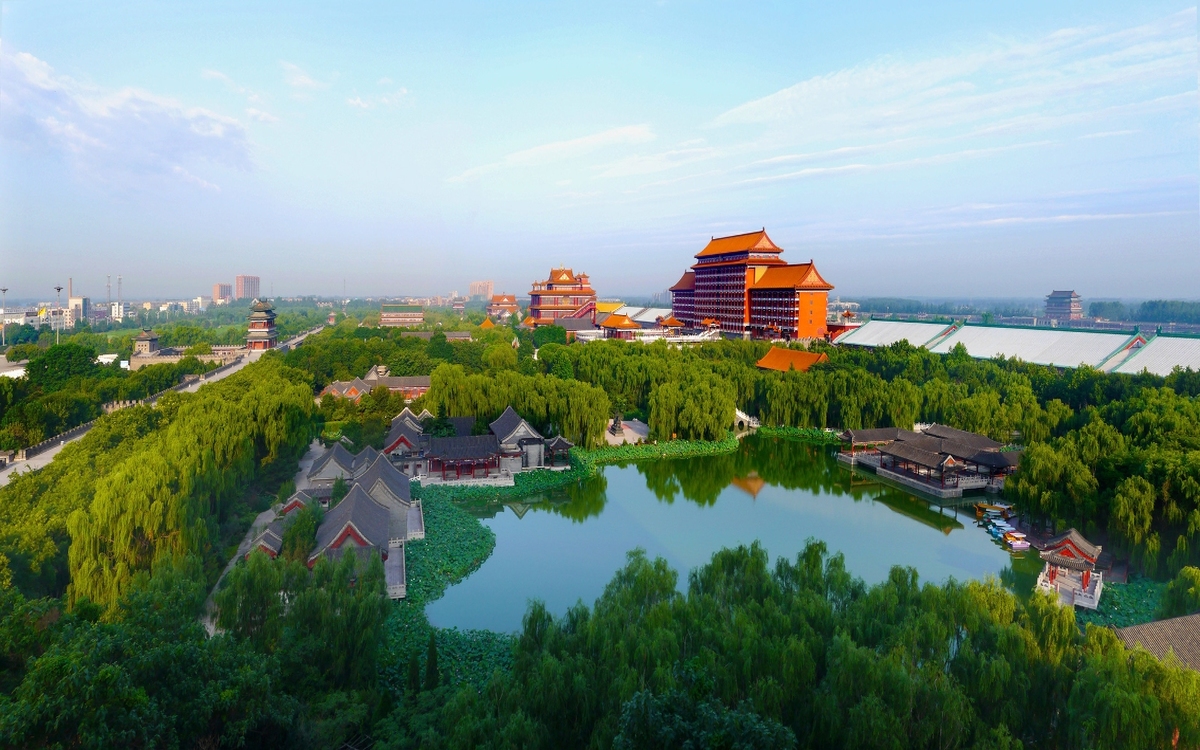- Hollywood studio executives gathered near Beijing asked questions, expressed willingness to collaborate
- Chinese delegates said Chinese history both is and is not on the table as an appropriate topic for film
- As deal flow steadies, being open to collaborating on Chinese stories might prove the take away

Grand Epoch City, site of a recent China-U.S. film summit. (CITIC Guoan Co. Ltd. and Dick Cook Studios.)
The growth of China’s movie industry has been so robust that guests from both sides of the Pacific gathered at the inaugural China/U.S. Motion Picture Summit on the outskirts of Beijing last week were practically falling over themselves trying to find the perfect superlative to describe it. And yet they couldn’t seem to agree about how to keep up the positive momentum.
It’s a ‘golden era’ for the Chinese movie industry one Chinese speaker suggested. No, it is more like a ‘diamond era’ countered another one from the U.S. Warner Bros. Executive Vice President Richard Fox took it even further, calling the boom—with box office growing at 48.7 percent in 2015—a ‘platinum era’, “or maybe there’s another valuable stone that will come about.”
The March 25 event was convened, organizers CITIC Guoan Co. and Dick Cook Studios said, to foster an ongoing conversation between filmmakers from Hollywood and China. Over two dozen studio executives who flew in from Hollywood were then driven more than two hours outside of the capital to the Grand Epoch City resort, a scaled-down version of Beijing’s ancient walled city so far from downtown as to fall in neighboring Hebei province.
Looking for answers, Hollywood delegates asked direct questions. What type of Hollywood movies the Chinese prefer to see imported onto Chinese screens? Chinese delegates’ answers were confusing at best.
“Film is not an entertainment tool,” Wang Xingdong, one of the writers of the 2009 state-backed propaganda super-production “The Founding of a Republic” (建国大业), told the audience of entertainment executives from Los Angeles. “[Film] reflects history,” Wang added, bemoaning the absence of American guests at a recent state-run spectacle: the grand military parade China’s leadership held in Tiananmen Square to celebrate the 70 years anniversary of winning the war against Japan on September 3, 2015. “I wish we could have seen an American guard of honor at the parade, however they didn’t come.”
“The Founding of a Republic” was produced in celebration of the 60th anniversary of the People’s Republic, and Wang said he thought it a good idea that the U.S. and China make more film co-productions that reflect their shared history of cooperation during WWII, fighting their common enemy, Japan.
But with that suggestion still hanging in the air, Zhang Xun a former general manager of the China Film Co-Production Corporation—the outfit through which one must clear co-productions—swiftly took history off the table as an ideal topic for collaboration.
In a panel discussion format, Producers Guild of America president Gary Lucchesi asked her for advice about what types of films American producers should pursue as co-productions. Zhang said the range of themes was “extremely broad” and China’s censors are “not strict about what is suitable.”
“But I can tell you what is not suitable,” said Zhang, a semi-regular guest in Hollywood over the last six years at events such as the Asia Society’s annual U.S.-China Film Summit. “For example, films that cover or describe Chinese leaders are not very suitable for co-productions. Because only Chinese people are able to fully understand Chinese history and write about it in the most complete and accurate way.”
“The thing both sides need to pay attention to when making co-productions is cultural differences, language differences, differences in values, world view as well as the concept of love,” said Zhang, who memorably sparred with outspoken Hollywood director Oliver Stone at the 4th Beijing International Film Festival in 2014, when he slammed the Chinese film industry for glorifying Mao and not facing up to history.
The conflicting messages from the Chinese delegates may partly explain why only around a dozen Sino-U.S. co-productions have been approved and made in the past five years. Industry analyst Rance Pow, president of Shanghai- and Los Angeles-based consultancy Artisan Gateway, put it this way: “China has its own stories and Hollywood has its own stories to tell.”
The talk-fest outside Beijing arrived as Hollywood studios are trying a new approach in breaching the Great Wall to reach China’s fast-growing consumer market, projected to buy more movie tickets than the U.S. inside the next year or two. While earlier China ventures led by Warner, Columbia, and Relativity stumbled, the latest attempts by Hollywood have the studios taking more of a backseat to their Chinese partners—now that the Chinese are providing most of the capital.
Veteran American producer Fox of Warner outlined the new approach of the new China-focused joint venture Flagship Entertainment he is now heading.
“We formed this joint venture, we’re a minority partner in this, and it’s usually the Americans who come in and they want to take control. This has been a great opportunity for us to come in as we are,” Fox said.
While Warner Bros. owns 49 percent of Flagship, the controlling interest is owned by China Media Capital (CMC), a state-backed investment fund.
“If there’s anything I’ve learned and we’ve learned, and my colleagues at other studios have learned, it’s collaboration will make us all succeed. This is too big a market for us to say ‘we have the right way, you have the right way’—this is what the essence of our success will be,” Fox said.
Stuart Ford, founder and CEO of IM Global also used what he called “one of the catchphrases of the day”—namely “collaboration”—to explain the recent attempts at entering the Chinese market.
“I think that the raison d’être for these more recent alliances has been pursuing some kind of strategic plan that’s to the mutual benefit of both partners as opposed to maybe a U.S. partner coming to China to shake the tree or try and maximize what they can get out of the Chinese marketplace” Ford said. “The ventures that will succeed in future are the ones where there’s a true alignment of interests between both the Chinese and the American sides.”
While Hollywood takes a more conciliatory approach, Chinese companies are moving more confidently out into the global film industry, buying up swathes of Hollywood.
“What we’ve seen over the last five years is an initial sort of learning period, where both the entertainment community and the financial community in China were curious as to the Hollywood machinery and the economics of the business, kicking the tires,” Ford said. “Now we’re in a really steady deal flow in the last couple of years, most of which centers around Chinese capital or Chinese companies investing in content production because the industry here has gotten comfortable with that process and also realizes the ever escalating value of premium content.”
Despite the fact that U.S. antitrust laws are supposed to prohibit the ownership of both movie studios and theater chains, China’s Dalian Wanda Group, which purchased theater chain AMC Theaters in 2012, was recently allowed to buy Legendary Pictures for $3.5 billion. The Wanda-controlled AMC has since announced it also intends to buy Carmike Cinemas in a $1.1 billion cash deal which would make it the largest theater circuit in the world with 8,400 screens.
But many of the Chinese delegates gathered at the summit bristled at any suggestion that China was mounting a takeover and Hollywood was capitulating, attempting to move back to anodyne talking points on which everyone seemed able to agree.
“Rather than talk about it in those terms, we should be talking about co-operation, respect, and win-win,” said Zhang.
Additional reporting Congzhe Zhang.





